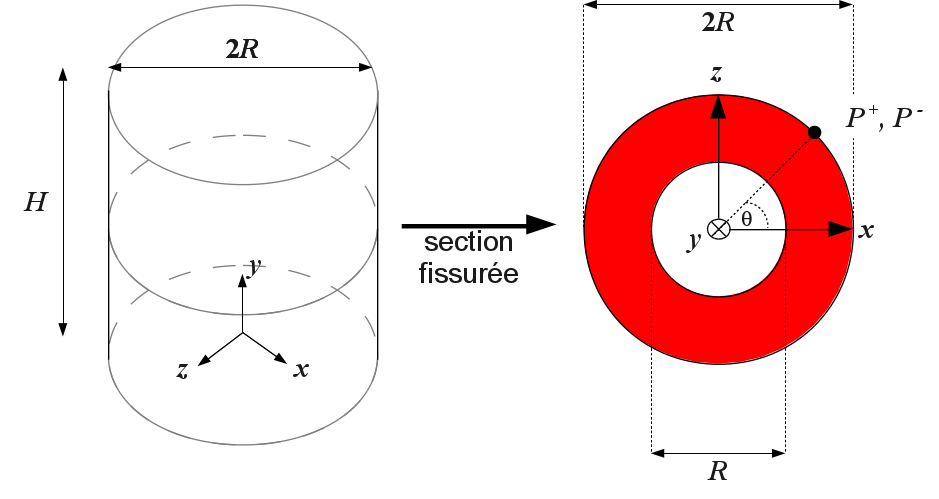1. Reference problem#
1.1. Geometry#
The structure, represented in the Figure, is a cylinder of radius \(R=1m\) and height \(H=2m\) including a plane crack on the section located halfway up. (included in equation plan \(y=H/2\)). The crack is open, and has as geometric support the crown with inner radius \(R/2\) and outer radius \(R\) (crown filled in red in Figure).
We call the « lower disk » the disk included in equation plane \(y\mathrm{=}0\), and « upper disk » the disk included in equation plane \(y=H\).

Figure 1.1-1: Problem geometry
Finally, we note \({P}^{\text{+}}(\theta )\) the coordinate point \(\left(R\mathrm{cos}\theta ,{H}^{\text{+}}/2,R\mathrm{sin}\theta \right)\) (located on the upper lip), and \({P}^{\text{-}}(\theta )\) the coordinate point \(\left(R\mathrm{cos}\theta ,{H}^{\text{-}}/2,R\mathrm{sin}\theta \right)\) (located on the lower lip)
1.2. Material properties#
Thermal conductivity: \(\lambda \mathrm{=}1{\mathit{W.m}}^{\text{-1}}\mathrm{.}{K}^{\text{-1}}\)
Calorific volume capacity: \(\rho {C}_{p}=2\mathit{J.m}-{\mathrm{3.K}}^{-1}\)
1.3. Boundary conditions and loads#
We solve the problem on the discretized time interval \(\left[0.s,1.s\right]\) in 5 equal time steps (of duration \(\Delta t=0.2s\)). We take the value by default in THER_LINEAIRE of the theta-schema parameter: \(\theta =0.57\).
On the nodes of the lower disk (cf. paragraph 1.1) the following temperature ramp is imposed:
to \(t=0\text{.}s\), \(\text{}\stackrel{̄}{T}{\text{}}^{\mathit{AB}}=10°C\); to \(t=1\text{.}s\), \(\text{}\stackrel{̄}{T}{\text{}}^{\text{sup}}=20°C\)
On the nodes of the upper disk (cf. paragraph 1.1) the following temperature ramp is imposed:
to \(t=0\text{.}s\), \(\text{}\stackrel{̄}{T}{\text{}}^{\text{inf}}=20°C\); to \(t=1\text{.}s\), \(\text{}\stackrel{̄}{T}{\text{}}^{\text{inf}}=40°C\)
1.4. Initial conditions#
The initial state is determined by solving the stationary problem at \(t\mathrm{=}0\text{.}s\) (with the boundary conditions given in paragraph 1.3)